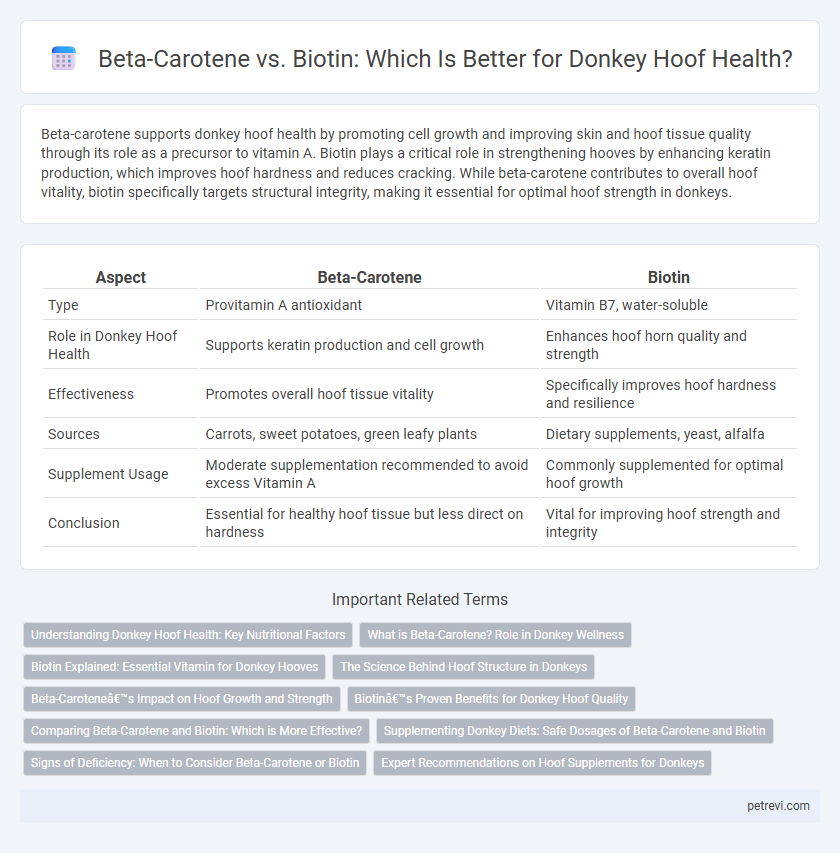Beta-carotene supports donkey hoof health by promoting cell growth and improving skin and hoof tissue quality through its role as a precursor to vitamin A. Biotin plays a critical role in strengthening hooves by enhancing keratin production, which improves hoof hardness and reduces cracking. While beta-carotene contributes to overall hoof vitality, biotin specifically targets structural integrity, making it essential for optimal hoof strength in donkeys.
Table of Comparison
| Aspect | Beta-Carotene | Biotin |
|---|---|---|
| Type | Provitamin A antioxidant | Vitamin B7, water-soluble |
| Role in Donkey Hoof Health | Supports keratin production and cell growth | Enhances hoof horn quality and strength |
| Effectiveness | Promotes overall hoof tissue vitality | Specifically improves hoof hardness and resilience |
| Sources | Carrots, sweet potatoes, green leafy plants | Dietary supplements, yeast, alfalfa |
| Supplement Usage | Moderate supplementation recommended to avoid excess Vitamin A | Commonly supplemented for optimal hoof growth |
| Conclusion | Essential for healthy hoof tissue but less direct on hardness | Vital for improving hoof strength and integrity |
Understanding Donkey Hoof Health: Key Nutritional Factors
Beta-carotene supports donkey hoof health by promoting keratin production and improving overall hoof strength through its role as a precursor to vitamin A. Biotin, a B-vitamin, is critical for enhancing hoof horn quality and accelerating regrowth, making it essential in preventing cracks and brittleness. Balancing beta-carotene and biotin intake ensures optimal hoof integrity by addressing different biochemical pathways vital for maintaining strong, healthy hooves in donkeys.
What is Beta-Carotene? Role in Donkey Wellness
Beta-carotene is a precursor of vitamin A and a powerful antioxidant that supports skin and hoof health in donkeys. It plays a crucial role in promoting cell regeneration and maintaining strong, resilient hooves by enhancing keratin synthesis. Adequate beta-carotene intake helps prevent hoof cracking and supports overall donkey wellness by boosting immune function and reducing oxidative stress.
Biotin Explained: Essential Vitamin for Donkey Hooves
Biotin is a vital B-vitamin that supports the growth and strength of donkey hooves by promoting keratin production, the protein that forms hoof structure. Unlike beta-carotene, which primarily contributes to vision and immune function, biotin directly improves hoof quality, resilience, and reduces cracking and splitting. Supplementing donkey diets with biotin has been shown to accelerate hoof repair and maintain overall hoof integrity.
The Science Behind Hoof Structure in Donkeys
Beta-carotene plays a crucial role in promoting healthy hoof growth in donkeys by supporting cellular regeneration and keratin synthesis, essential for the strong structure of the hoof wall. Biotin, a B-vitamin, is vital for enhancing hoof hardness and elasticity through its involvement in fatty acid metabolism, directly impacting the quality of the hoof's outer layer. Research on donkey hoof anatomy reveals that optimal levels of both beta-carotene and biotin contribute to a resilient hoof structure capable of withstanding environmental stresses and mechanical loads.
Beta-Carotene’s Impact on Hoof Growth and Strength
Beta-carotene plays a crucial role in promoting donkey hoof growth and strength by enhancing keratin synthesis, which is essential for durable hoof structure. Studies indicate that adequate beta-carotene intake improves hoof density and reduces the risk of cracks by supporting cellular regeneration within the hoof matrix. While biotin also benefits hoof quality, beta-carotene's antioxidant properties specifically target oxidative stress, contributing to healthier, more resilient hooves in donkeys.
Biotin’s Proven Benefits for Donkey Hoof Quality
Biotin is critical for enhancing donkey hoof quality by stimulating keratin production, which strengthens the hoof wall and reduces cracking and splitting. Studies indicate that consistent biotin supplementation leads to improved hoof hardness, faster growth, and increased resistance to hoof diseases in donkeys. Beta-carotene, while beneficial for overall health and immune function, lacks direct evidence supporting significant improvements in hoof structure compared to biotin's targeted effects.
Comparing Beta-Carotene and Biotin: Which is More Effective?
Beta-carotene and biotin both play essential roles in promoting donkey hoof health, with biotin being scientifically proven to strengthen hoof keratin and improve growth rate more effectively. Beta-carotene, a precursor to vitamin A, supports overall skin and hoof tissue health but lacks direct evidence of enhancing hoof hardness or regeneration compared to biotin. Studies indicate that biotin supplementation at doses of 15-20 mg per day yields significant improvements in hoof integrity, making it a preferred choice for targeted hoof care in donkeys.
Supplementing Donkey Diets: Safe Dosages of Beta-Carotene and Biotin
Supplementing donkey diets with beta-carotene and biotin supports optimal hoof health by promoting keratin synthesis and improving tissue repair. Safe dosages typically range from 10,000 to 20,000 IU of beta-carotene and 15 to 20 mg of biotin per day, ensuring effective absorption without toxicity. Regular monitoring of hoof condition and adjusting supplementation based on nutritional needs enhances overall hoof strength and resilience in donkeys.
Signs of Deficiency: When to Consider Beta-Carotene or Biotin
Signs of beta-carotene deficiency in donkeys often include dull coat, poor immune response, and slow hoof growth, indicating a need for increased dietary intake or supplementation. Biotin deficiency typically presents as brittle, cracked, or split hooves, along with slow or abnormal hoof horn development, signaling the importance of biotin for hoof keratin synthesis. Monitoring these specific symptoms helps determine whether beta-carotene or biotin supplementation is necessary to restore optimal hoof health in donkeys.
Expert Recommendations on Hoof Supplements for Donkeys
Experts recommend prioritizing biotin supplementation over beta-carotene for donkey hoof health due to its critical role in keratin synthesis and hoof wall strength. Research indicates daily biotin doses of 15 to 20 mg improve hoof quality and growth rate significantly, whereas beta-carotene primarily supports vision and immune function without direct hoof benefits. Veterinary professionals often suggest combining biotin with trace minerals like zinc and methionine for optimal hoof integrity in donkeys.
Beta-carotene vs Biotin for Donkey Hoof Health Infographic

 petrevi.com
petrevi.com